

Objectives - Lesson Plan Objectives and Goals. Definition: Objectives are the first step in writing a strong 8-step lesson plan.
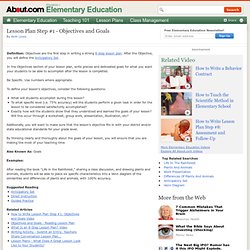
After the Objective, you will define the Anticipatory Set. In the Objectives section of your lesson plan, write precise and delineated goals for what you want your students to be able to accomplish after the lesson is completed. Be Specific. Use numbers where appropriate. To define your lesson's objectives, consider the following questions: What will students accomplish during this lesson? Additionally, you will want to make sure that the lesson's objective fits in with your district and/or state educational standards for your grade level. By thinking clearly and thoroughly about the goals of your lesson, you will ensure that you are making the most of your teaching time. Also Known As: Goals. Lesson Plan Writing Guide. This guide is not meant to be the one and only way to develop a lesson plan.
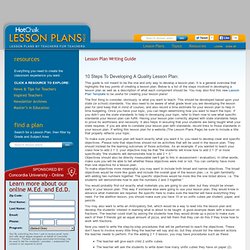
It is a general overview that highlights the key points of creating a lesson plan. Below is a list of the steps involved in developing a lesson plan as well as a description of what each component should be. You may also find this new Lesson Plan Template to be useful for creating your lesson plans! The first thing to consider, obviously, is what you want to teach. This should be developed based upon your state (or school) standards. That’s it! The 5 E Learning Cycle Model. Priming the Pump: Peter Elbow's prompts to help students explore topics, objects, places, issues Questions to help a student write about someone s/he has studied or read about: · Describe _ as an ordinary person. · What was/is special or unique about _ ?
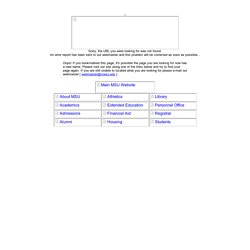
· Imagine _ were the opposite sex: describe the life s/he would have lived. · What if _ had lived in a different era, such as _ : describe the life s/he would have lived. · Make up or guess what might have been an important event in _'s childhood. · Create a soap opera plot with _ in it. · What does _ most need to cry about? Lesson Plans 4 Teachers: Lesson Plan Templates. Anatomy of a Lesson Plan. Lesson Planning. A sure ingredient in a recipe for disaster is "winging it.
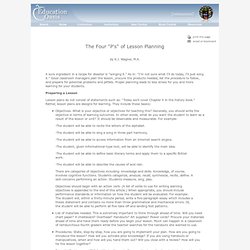
" As in: "I'm not sure what I'll do today, I'll just wing it. " Good classroom managers plan the lesson, procure the products needed, list the procedure to follow, and prepare for potential problems and pitfalls. Proper planning leads to less stress for you and more learning for your students. Preparing a Lesson Lesson plans do not consist of statements such as: "Today we'll cover Chapter 4 in the history book. " Writing Lesson Plans - 8 Steps to Writing a Perfect Lesson Plan. Whether you're working on your teaching credential or being reviewed by an administrator or evaluator, you will often need to write out a lesson plan during your teaching career.
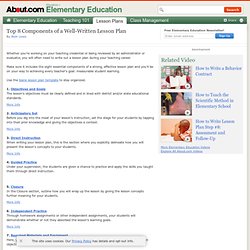
Make sure it includes the eight essential components of a strong, effective lesson plan and you'll be on your way to achieving every teacher's goal: measurable student learning. Use the blank lesson plan template to stay organized. 1. Objectives and Goals The lesson's objectives must be clearly defined and in lined with district and/or state educational standards. 2. Before you dig into the meat of your lesson's instruction, set the stage for your students by tapping into their prior knowledge and giving the objectives a context. 3. Writing Learning Objectives. Freeology - Free School Stuff. Funbrain.
Classroom Ideas. Goals and Objectives. Before you do anything, you’ll need to focus your objective(s) for the class.
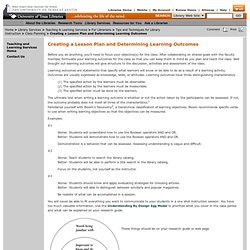
After collaborating on shared goals with the faculty member, formulate your learning outcomes for the class so that you can keep them in mind as you plan and teach the class. Well thought out learning outcomes will give structure to the discussion, activities and assessment of the class. Learning outcomes are statements that specify what learners will know or be able to do as a result of a learning activity. Outcomes are usually expressed as knowledge, skills, or attitudes. Learning outcomes have three distinguishing characteristics. (1) The specified action by the learners must be observable The ultimate test when writing a learning outcome is whether or not the action taken by the participants can be assessed. Examples: Worse: Students will understand how to use the Boolean operators AND and OR. Demonstration is a behavior that can be assessed. Worse: Teach students to search the library catalog. Dopa Responsive Dystonia. Planboard — Lesson planning made easy for teachers and educators.
Schoolfy. Taxonomies of Educational Objectives (Teaching and Learning Laboratory @ MIT) TeachersPayTeachers.com - An Open Marketplace for Original Lesson Plans and Other Teaching Resources. Free Internet Tools for Teachers at Internet 4 Classrooms.